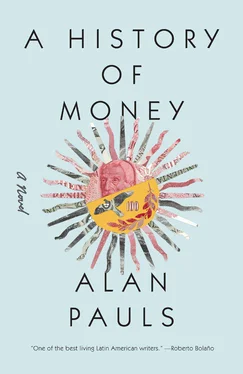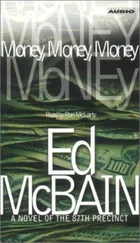And then his mother succumbs to a delirium of requests. She doesn’t just need help buying herself a heater or a new coat at the beginning of winter any longer, or having new carpet put in the little apartment she moves into, or finally replacing the contraption on which she struggles to complete her translations, a slow, purring machine that frequently quakes with distant digestive crunching, which she inherited from the stereotypical rich friend who suffers an attack of generosity three times a year, for no other reason than that she wants a change of scenery, and begins to give things away left and right, using members of her court to liberate herself of all the trash cluttering her palace: furniture, lamps, works of art, clothes, electrical appliances she has no idea how to use and has never even taken out of their boxes.
Sometimes late at night — very late, at the hour when the only things that happen unexpectedly are mistakes and tragedies — the phone starts to howl, and he answers it still half asleep, thinking that if he can find his glasses on the nightstand, where he thinks he left them, and put them on, even if they’re upside down, he’ll be able to hear better, to understand what he hears better, or pretend to for this interlocutor who can’t see him, and then his mother’s voice spills a few drops of desperate lucidity into the labyrinth of his ear. She doesn’t shout, she’s not forceful, everything she says is very measured, but her voice comes to him from another hemisphere, a strange, polar world, or the desert, somewhere where it’s always daytime and everybody’s always awake. It’s two o’clock. While going through a pile of bills she thought she’d already paid, she’s come across a warning from the electric company: they’re threatening to cut her off if she doesn’t pay her balance tomorrow. At three thirty, the vacuum’s swallowed an electrical adapter, or a keychain, or a ball of yarn, and is now snoring and coughing and blowing instead of sucking. Where will she find the money to get it fixed, since she hadn’t planned for this? At six, she’s just discovered, to her horror, a warning of extra costs in fine print on her monthly maintenance breakdown from her building’s management.
It’s the wonderful world of contingency, simultaneously varied and monotonous, that bursts in with each of these nocturnal cries for help. His mother, the only undeniably necessary presence in his life, a fundamental, originating, indisputable element, is now a realm of accident and uncertainty that ruins every plan. Sometimes, when he’s resigned himself to suffering these early-morning attacks, he thinks that perhaps he’d like them more if they took a different form. He misses — as though he’s ever actually experienced these things — a certain turmoil, the drama of hearing someone shout and their voice break, the operatic kind of desperation that can shift huge bodies of air around immense spaces with its pompous gestures, all key elements of an emotional realism that he doesn’t necessarily believe in — he is his mother’s son, after all — but which he wants to think would compensate, at least in strictly theatrical terms, for his being washed up onto the brittle shore of wakefulness once he hangs up the phone, after promising to get the money to her first thing in the morning. But his mother hates, has always hated, theater’s bombast, its eruptions, its sentimentalism, its sense of exaggeration. She asks, and she really is desperate, but the rhetorical model for her desperation isn’t a scene of catastrophe — which though they’re striking and sultry are also vulgar and always a bit humiliating — but rather rocky insomnia, which has everything she needs in order to be as dignified as a deposed queen: calm, dryness, tension, and the impression — which only seasoned connoisseurs can really appreciate — that everything is fine, in its place, in order, where it should be — apart from one thing, just one, something that’s not at all obvious — an eyelid that’s been fluttering for hours, her trembling hands, the blinding clarity of small or distant objects — but that will end up blowing everything to pieces.
One day it’s a root canal, the next the annual fee on her credit card, the next she’s a little overdrawn on her savings account. By the time he chooses to notice what’s going on, he’s become a crucial figure, a lifesaver, a financial ambulance who shows up, or should show up, with fresh money in his pocket as soon as he receives the alert. He’s become a drug to his mother. Sometimes he travels halfway across the city to pay for a cheap breakfast that’s been holding her up in a shabby bar, and the face she greets him with when he gets there sends a shiver down his spine. She’s always at the worst table in the place, the one closest to the restroom, in a draft, or threatened by the corner of a murderous window, looking very serious and concentrating very hard on something that only she can see or hear or feel, and she always has her coat on and her hands clamped around her bag, as though she thinks she’s about to be robbed. She says horrible things about the waiters, complains about the volume of the TV, and pushes her half-eaten meal away with a gesture of disgust, while a terrible volatility brews around her mouth, disrupting the thread of grooves that has accumulated above her upper lip over the years.
She never calls to ask him to pay. She wants the money herself. She wants the exact amount she needs, no matter whether she’s paying for a carrot-and-lettuce salad, a consultation with an osteopath, or an overdue bill for some plumbing work that takes her bathroom out of service for a week. He arrives, his mother tells him how much she needs — they’re always very precise amounts, often including centavos — and once she’s got her hands on the money, she suddenly gets impatient, keeping her mouth shut or giving him short, reluctant answers; treating him distantly and with disdain, like an acquaintance who’s taken too many liberties with her, and with the resentment and the same combination of pride and spite with which addicts spurn their dealers as soon as the fix they would have done anything for just ten minutes earlier is safely in their pockets.
Why doesn’t he just give her what she might be asking for: a reserve? There’s no great mystery in living hand to mouth, on the bare minimum. It’s an art that doesn’t require juggling skills, as is often supposed, but rather modest virtues: sobriety, a little order, a certain degree of calculation. But for someone who’s used to relying on what’s known as support, someone who has always enjoyed the indulgent protection of means, savings, and investments; who has permitted herself the luxury of not knowing what they are, where they are, how much they’re worth, or how they grow, but not the peace of mind they confer, not the levity with which they would allow her to face the future, feeling as radiant and optimistic as a traveler arriving in a foreign city very early in the morning, after an exhausting journey, and washing and going straight out, without sleeping, to lose herself on unknown streets — for someone like this, who’s been blessed for years by the existence of such a secret supply, it could be the most terrible of all nightmares. She who has lost everything has lost much more than her fortune. She has lost the precious margin of time her fortune granted to her, the interval, the magic buffer that shielded her from the immediate experience of things. Losing everything condemns her to a hell worse than poverty: the hell of living in the present.
He simply doesn’t trust his mother. If he were to give her the famous reserve, he thinks, not reproachfully, in fact forgiving her because the logic is so familiar to him, she would be incapable of saving it, she’d spend it all immediately, in a kind of trance, out of fear of dying and leaving behind, untouched, some capital that could have made her happy, or in the grip of the frenzied desire for revenge that’s always waiting, in varying degrees of hibernation, in every ruined woman. She’d soon be just as desperate as before: drowning in the hardships of daily life, eaten away at by fear of her most dreaded specter — the unexpected expense — and then devoured by the guilt of having spent the money that would have allowed her to confront it.
Читать дальше












